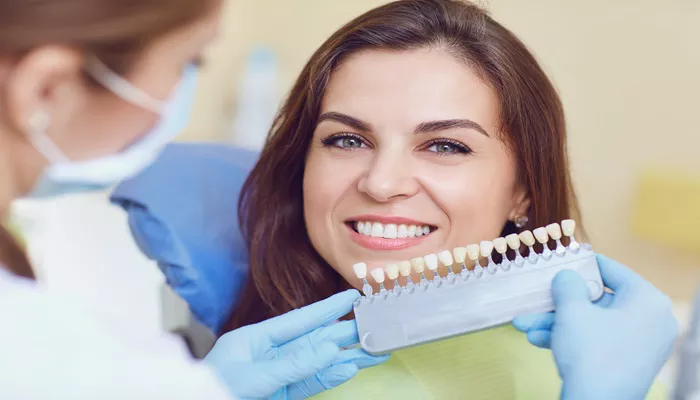A bright and white smile is often associated with confidence, beauty, and good oral health. Many people seek ways to whiten their teeth, and one of the most effective methods is professional whitening at a dental clinic. However, a common question arises: Is teeth whitening at the dentist safe?
In this article, we will explore the safety aspects of professional teeth whitening, the procedures involved, possible side effects, and how to minimize risks. Understanding these factors will help you make an informed decision about whether this cosmetic treatment is right for you.
What Is Professional Teeth Whitening?
Professional teeth whitening is a procedure performed by a licensed dentist using specialized whitening agents. These whitening agents contain hydrogen peroxide or carbamide peroxide, which break down stains on the teeth and make them appear whiter.
The two main types of professional whitening include:
In-Office Whitening – This involves applying a high-concentration bleaching gel to the teeth, sometimes activated by a special light or laser. The process usually takes about 60–90 minutes and provides immediate results.
Take-Home Whitening Kits – The dentist provides custom-made trays and a lower concentration bleaching gel for home use. This process takes longer but is also effective.
How Safe Is Teeth Whitening at the Dentist?
Professional teeth whitening is generally safe when performed by a trained dentist. The American Dental Association (ADA) has approved many whitening treatments used by professionals, ensuring they meet safety standards. Here are some reasons why whitening at the dentist is considered safe:
Controlled Environment – Dentists carefully monitor the procedure to prevent excessive exposure to whitening agents.
Proper Use of Whitening Agents – Dentists use high-quality, professional-grade whitening agents in the correct concentrations.
Customized Treatment – Dentists assess your teeth and gums before whitening to ensure the treatment is suitable for you.
Gum Protection – Special protective barriers or gels are applied to protect the gums from irritation.
Minimized Sensitivity – Dentists can adjust the treatment to reduce sensitivity, providing post-whitening care recommendations.
Possible Side Effects of Teeth Whitening
While teeth whitening at the dentist is safe, some individuals may experience mild side effects. The most common ones include:
Tooth Sensitivity – Some people may experience increased sensitivity to hot, cold, or sweet foods and drinks. This usually subsides within a few days.
Gum Irritation – Whitening agents can cause temporary irritation if they come into contact with the gums. Dentists use protective measures to minimize this risk.
Uneven Whitening – If you have dental restorations (such as crowns, veneers, or fillings), they will not whiten like natural teeth, leading to uneven coloration.
Mild Discomfort – Some patients may experience temporary tingling or a mild burning sensation, which typically goes away within a few hours.
How to Minimize Risks And Side Effects
To ensure the safest teeth whitening experience, follow these precautions:
Choose a Qualified Dentist – Always visit a licensed and experienced dentist for whitening treatments.
Follow Pre-Treatment Advice – Your dentist may recommend using desensitizing toothpaste before whitening.
Avoid Overuse – Frequent whitening can weaken enamel. Stick to your dentist’s recommendations for touch-ups.
Maintain Good Oral Hygiene – Brushing, flossing, and using fluoride toothpaste can help maintain your results and protect enamel.
Avoid Staining Foods and Drinks – Coffee, tea, red wine, and tobacco can cause discoloration. Limit consumption to keep your teeth whiter for longer.
Who Should Avoid Teeth Whitening?
While professional teeth whitening is safe for most people, some individuals should avoid or postpone the procedure:
Pregnant or Nursing Women – There is limited research on the effects of whitening agents during pregnancy and breastfeeding, so it is best to wait.
Individuals with Gum Disease or Tooth Decay – These conditions should be treated before whitening to prevent further complications.
People with Extremely Sensitive Teeth – If you have severe sensitivity, your dentist may recommend alternative treatments.
Those with Dental Restorations – If you have multiple crowns, veneers, or fillings on visible teeth, whitening may not be suitable as it will not change their color.
Conclusion
So, is teeth whitening at the dentist safe? Yes, when performed by a qualified professional, teeth whitening is a safe and effective way to enhance your smile. The procedure is controlled, monitored, and customized to your needs, reducing risks and side effects. However, it is essential to follow your dentist’s advice and take preventive measures to ensure the best results with minimal discomfort.
If you are considering professional teeth whitening, consult your dentist to determine if it is the right option for you. A brighter, healthier smile can boost your confidence and improve your overall appearance safely and effectively.

